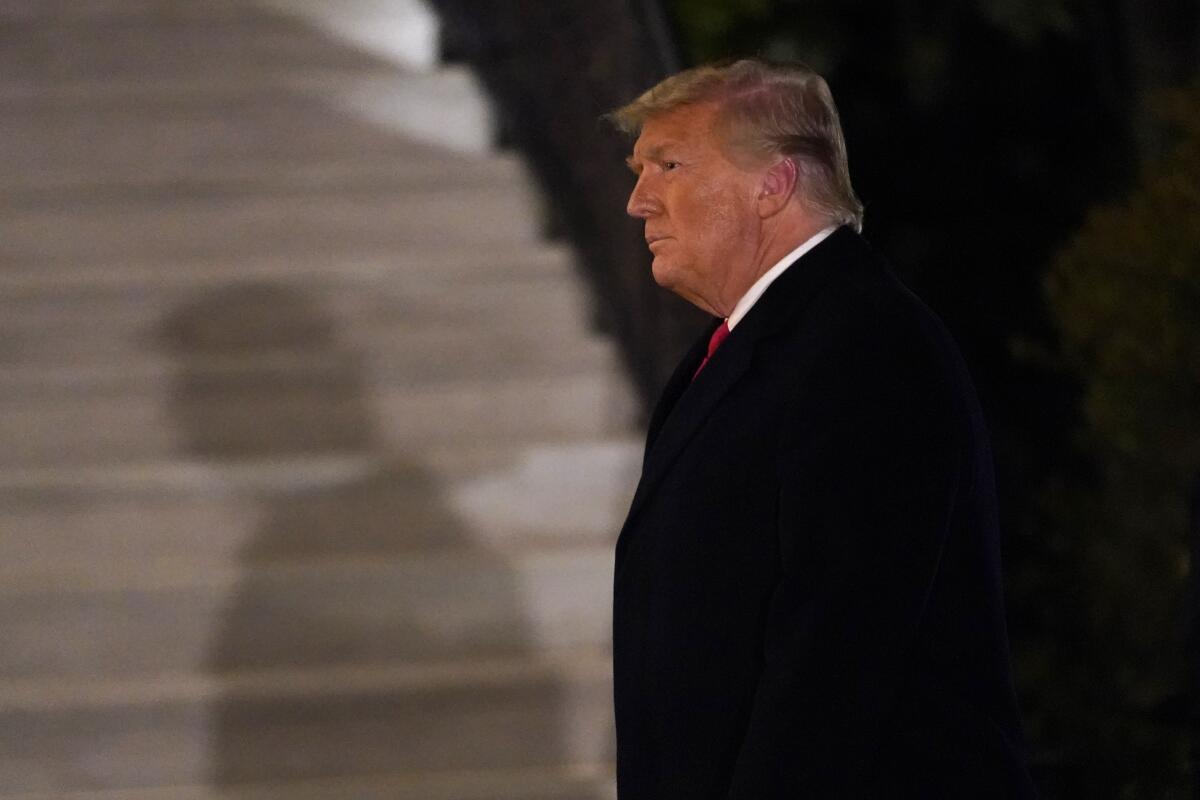McConnell wants to delay Trump impeachment trial to February

- Share via
WASHINGTON — Former President Trump’s Senate impeachment trial is unlikely to get started for days if not weeks as Republicans try to give Trump time to put together a legal team to defend himself against a charge of inciting an insurrection in the U.S. Capitol.
It is not yet clear whether Senate Democrats and Speaker Nancy Pelosi (D-San Francisco), who controls when the article of impeachment moves from the House to the Senate, will go along with the request.
Senate Minority Leader Mitch McConnell (R-Ky.) is expected to pitch Senate Majority Leader Charles E. Schumer (D-N.Y.) on starting the trial in February.
McConnell’s proposal calls for pretrial proceedings, such as the swearing in of senators and issuance of a summons to Trump, to take place Jan. 28. From there, briefs would be due Feb. 4 and Feb. 11, giving Trump’s team a total of 14 days to prepare briefs. The House impeachment managers would reply Feb. 13.
A trial would presumably begin after that. Some are pushing for a vastly abbreviated three-day trial, with 12 hours of arguments for each side. But no decisions have been made.
A spokesman for Schumer said the proposal is under review. Democrats may have reason to go along with the schedule, particularly if in return they can get cooperation from Republicans in moving faster to confirm President Biden’s Cabinet appointments, a process that is lagging past administrations.
Both Republicans and Democrats have expressed support for giving Trump time to find legal representation. The Office of White House Counsel, along with other private attorneys, represented Trump in his first impeachment trial last year. But as a former president, he will need to find new lawyers.
“He has a right to defend himself,” said Sen. Shelley Moore Capito (R-W.Va.) after Senate Republicans discussed timing on a conference call Thursday. “I don’t think this is something that we should rush into when you’re talking about the gravity of it.”
Sen. Lindsey Graham (R-S.C.), who is close with Trump, said McConnell’s timeline is “acceptable to the former president’s legal team” and provides enough time to allow Trump’s team to prepare.
Graham, who spoke to Trump on Thursday, said South Carolina lawyer Butch Bowers would lead the defense.
“The president looks forward to getting this behind him — [he] believes it’s unconstitutional and damages his presidency — but you know he’s going to have his day in court and that’s the way the system works,” Graham said.
Republicans are expected to mount an argument that an impeachment trial after the president is out of office is unconstitutional. Democrats have pointed out that there is a precedent, though not involving a president. It is likely to be a significant part of the trial.
Once Pelosi moves the article to the Senate, it will set off an immediate chain of events, including the start of the trial unless all 100 senators agree to change the timetable. Given the fact that her fellow Democrats control the Senate, Pelosi is unlikely to send the articles until Senate Democrats are ready.
The trial timing is just one of two major points of negotiation between McConnell and Schumer as Democrats take control of the Senate for the first time since 2015.
The chamber is now divided 50-50 with Democrats in control because of the tiebreaking power of Vice President Kamala Harris. Because of the even split, the leaders need to come to an agreement on how the Senate will operate, such as how many senators will sit on committees.
Schumer and McConnell met in person this week, but both reported little progress. It is unknown when they will meet in person to negotiate further.
The organizing resolution is typically a perfunctory move that gathers little attention. Both parties are using the framework of a deal cut in 2001, when the Senate was evenly divided. Under that, Democrats would control the committees, but the membership would be evenly split.
McConnell is demanding as part of the deal that Democrats also agree to preserve the legislative filibuster — which essentially requires 60 votes to advance a bill. Democrats have not agreed, fearing it would allow Republicans to block much of Biden’s agenda.
Though progressives and some Democrats on the Hill are eager to do away with the filibuster, several Senate Democrats are reluctant to do so. Sen. Joe Manchin III (D-W.Va.) has said he does not support the idea, suggesting Democrats wouldn’t have the votes to eliminate the filibuster anyway.
But Democratic leaders are reluctant to give away that leverage now and have suggested that they could change the Senate rules to write their own bill. If they did so, Republicans would likely decry it as an elimination of Senate norms.
“Hopefully this is a bipartisan agreement,” said Sen. Debbie Stabenow (D-Mich.). “If not, then we’d have to move forward with a partisan vote.”
Until the resolution is done, the Senate is operating in a sense of limbo. Schumer and Democrats control the chamber, but committees are operating under last year’s rules, meaning Republicans are still chairing them.
More to Read
Get the L.A. Times Politics newsletter
Deeply reported insights into legislation, politics and policy from Sacramento, Washington and beyond. In your inbox twice per week.
You may occasionally receive promotional content from the Los Angeles Times.











